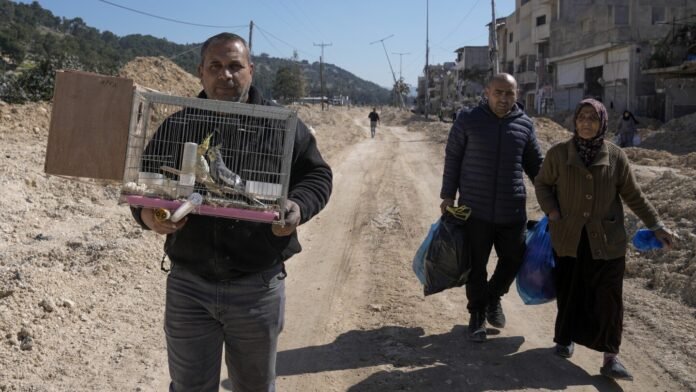JENIN, West Bank (news agencies) — When Israeli snipers took positions in her neighborhood, Haleemeh Zawaydeh knew her family needed to leave quickly. As the snipers’ gunfire rang out, the 63-year-old matriarch said there was no time to pack as she and 14 other family members fled on foot.
The invasion of Jenin was faster than past Israeli assaults, she said. And, now, like some 37,000 other Palestinians the U.N. estimates have been driven out by a month-old offensive against militant groups in the occupied West Bank, Zawaydeh and her family are waiting to return to the place they’ve long called home.
But it’s unclear if Israel will let them. Israel’s assault has mostly emptied four refugee camps — sites that originated to house Palestinians driven from homes in the 1948 war surrounding Israel’s creation and have since grown into densely built up towns or neighborhoods.
Across the four camps, troops have ripped up roads and destroyed buildings, infrastructure, and water and electricity lines. The Israeli defense minister said Monday that troops were preparing to stay for a year and would prevent Palestinians from returning.
That leaves thousands who hail from among the poorest areas of the West Bank in dire straits as many are forced to rent temporary housing in neighboring villages. OCHA, the U.N.’s humanitarian agency, said there is an “urgent need for cash assistance” for 4,000 families to meet rent needs.
Zawaydeh said she was safe now at her shelter outside Jenin, but not at ease.
“I was born and raised in the camp, and now I have grown up and I still live in the camp,” she said. “There is no place that can replace the camp.”
Many Palestinians displaced from their West Bank homes are renting temporary housing or relying on friends or family to take them in. Some are staying in university dorms, others in makeshift shelters. Help is limited: The Palestinian Authority is strapped for cash, and the main U.N. agency for Palestinian refugees, known by the acronym UNRWA, has been handicapped by Israeli legislation.
“The West Bank has never seen large-scale forced displacement of the level we’re seeing now” since 1967, said Roland Friedrich, the West Bank field director for UNRWA. During the 1967 Mideast War, some 250,000 Palestinians were forced from the West Bank when Israel seized the territory along with east Jerusalem and the Gaza Strip.
After announcing a widespread crackdown against West Bank militants on Jan. 21 — just two days after it began a ceasefire with Hamas in Gaza — Israeli forces descended on Jenin camp, as they have dozens of times since Hamas’ Oct. 7, 2023, attack on Israel. But unlike past operations, Israeli forces also pushed deeper and more forcefully into several other nearby camps known as bastions of militant groups, including Tulkarem, Far’a and Nur Shams.
Israel’s military says it has engaged in fierce battles with Palestinian militants inside the camps, which are now mainly emptied of their civilian populations.
The dispersals are stirring bitter memories of the 1948 war over Israel’s creation, when some 750,000 Palestinians were expelled from or fled their homes in what’s now Israel. Forcible population transfers are banned under international law, and, if implemented as a policy, could be a war crime, rights groups say.
The emptying of the West Bank camps comes as Israel’s government and military have embraced U.S. President Donald Trump’s call for pushing out the population of the Gaza Strip permanently.
In Nur Shams, a smaller refugee camp with a population of roughly 13,700, a number of displaced people returned Wednesday to clear what possessions they could from their homes after learning the Israeli military had slated them for demolition. Palestinians said the military puts out maps of intended demolitions in the camps. Asked the reasons for the demolitions, the military said it could not discuss operational plans.
Mohammed Abdullah took advantage of the brief access to visit the grave of his son, Ali, who he said was killed by Israeli troops during a previous incursion into the camp. He hadn’t been able to visit since being forced out two weeks ago.

